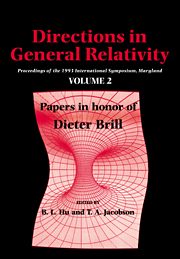 Directions in General Relativity
Directions in General Relativity Book contents
- Frontmatter
- Contents
- Contributors
- Symposium Program
- Papers from both Volumes Classified by Subjects
- Preface
- Dieter Brill: A Spacetime Perspective
- Thawing the Frozen Formalism: The Difference Between Observables and What We Observe
- Jacobi's Action and the Density of States
- Decoherence of Correlation Histories
- The Initial Value Problem in Light of Ashtekar's Variables
- Status Report on an Axiomatic Basis for Functional Integration
- Solution of the Coupled Einstein Constraints On Asymptotically Euclidean Manifolds
- Compact Cauchy Horizons and Cauchy Surfaces
- The Classical Electron
- Gauge (In)variance, Mass and Parity in D=3 Revisited
- Triality, Exceptional Lie Groups and Dirac Operators
- The Reduction of the State Vector and Limitations on Measurement in the Quantum Mechanics of Closed Systems
- Quantum Linearization Instabilities of de Sitter Spacetime
- What is the True Description of Charged Black Holes?
- Limits on the Adiabatic Index in Static Stellar Models
- On the Relativity of Rotation
- Recent Progress and Open Problems in Linearization Stability
- Brill Waves
- You Can't Get There from Here: Constraints on Topology Change
- Time, Measurement and Information Loss in Quantum Cosmology
- Impossible Measurements on Quantum Fields
- A New Condition Implying the Existence of a Constant Mean Curvature Foliation
- Maximal Slices in Stationary Spacetimes with Ergoregions
- (1 + 1)-Dimensional Methods for General Relativity
- Coalescence of Primal Gravity Waves to Make Cosmological Mass Without Matter
- Curriculum Vitae of Dieter Brill
- Ph. D. Theses supervised by Dieter Brill
- List of Publications by Dieter Brill
Impossible Measurements on Quantum Fields
Published online by Cambridge University Press: 06 January 2010
- Frontmatter
- Contents
- Contributors
- Symposium Program
- Papers from both Volumes Classified by Subjects
- Preface
- Dieter Brill: A Spacetime Perspective
- Thawing the Frozen Formalism: The Difference Between Observables and What We Observe
- Jacobi's Action and the Density of States
- Decoherence of Correlation Histories
- The Initial Value Problem in Light of Ashtekar's Variables
- Status Report on an Axiomatic Basis for Functional Integration
- Solution of the Coupled Einstein Constraints On Asymptotically Euclidean Manifolds
- Compact Cauchy Horizons and Cauchy Surfaces
- The Classical Electron
- Gauge (In)variance, Mass and Parity in D=3 Revisited
- Triality, Exceptional Lie Groups and Dirac Operators
- The Reduction of the State Vector and Limitations on Measurement in the Quantum Mechanics of Closed Systems
- Quantum Linearization Instabilities of de Sitter Spacetime
- What is the True Description of Charged Black Holes?
- Limits on the Adiabatic Index in Static Stellar Models
- On the Relativity of Rotation
- Recent Progress and Open Problems in Linearization Stability
- Brill Waves
- You Can't Get There from Here: Constraints on Topology Change
- Time, Measurement and Information Loss in Quantum Cosmology
- Impossible Measurements on Quantum Fields
- A New Condition Implying the Existence of a Constant Mean Curvature Foliation
- Maximal Slices in Stationary Spacetimes with Ergoregions
- (1 + 1)-Dimensional Methods for General Relativity
- Coalescence of Primal Gravity Waves to Make Cosmological Mass Without Matter
- Curriculum Vitae of Dieter Brill
- Ph. D. Theses supervised by Dieter Brill
- List of Publications by Dieter Brill
Summary
Abstract
It is shown that the attempt to extend the notion of ideal measurement to quantum field theory leads to a conflict with locality, because (for most observables) the state vector reduction associated with an ideal measurement acts to transmit information faster than light. Two examples of such information-transfer are given, first in the quantum mechanics of a pair of coupled subsystems, and then for the free scalar field in flat spacetime. It is argued that this problem leaves the Hilbert space formulation of quantum field theory with no definite measurement theory, removing whatever advantages it may have seemed to possess vis a vis the sum-over-histories approach, and reinforcing the view that a sum-over-histories framework is the most promising one for quantum gravity.
INTRODUCTION: IDEAL MEASUREMENTS AND QUANTUM FIELD THEORY
Whatever may be its philosophical limitations, the textbook interpretation of nonrelativistic quantum mechanics is probably adequate to provide the quantum formalism with all the predictive power required for laboratory applications. It is also self-consistent in the sense that there exist idealized models of measurements which allow the system-observer boundary to be displaced arbitrarily far in the direction of the observer. And the associated “transformation theory” possesses a certain formal beauty, seemingly realizing the “complementarity principle” in terms of the unitary equivalence of all orthonormal bases.
- Type
- Chapter
- Information
- Directions in General RelativityProceedings of the 1993 International Symposium, Maryland: Papers in Honor of Dieter Brill, pp. 293 - 305Publisher: Cambridge University PressPrint publication year: 1956
- 13
- Cited by
